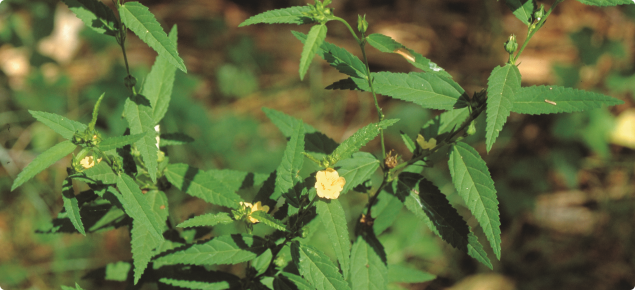- This topic is empty.
- AuthorPosts
- ሚያዝያ 12, 2025 at 11:42 ኤኤም #626398

Pesticide use in agriculture has long been a subject of debate due to its impact on the environment, human health, and biodiversity. As the need for more sustainable alternatives grows, researchers are increasingly turning to bio-pesticides derived from plants to mitigate pest problems.
One such promising plant is Sida acuta, a plant known for its potential to act as a natural pesticide. The evaluation of Sida acuta leaf extracts as a bio-pesticide for crop pest management offers hope for reducing dependency on harmful chemical pesticides while providing an effective solution to pest control.
1. Background of Sida Acuta and Its Bioactive Compounds
Sida acuta, commonly referred to as the “wire weed,” is a plant found in tropical and subtropical regions. It has been widely studied for its medicinal properties, but recent research has focused on its potential in agricultural pest management.
The leaves of Sida acuta contain various bioactive compounds, such as alkaloids, flavonoids, and saponins, which have been shown to exhibit pesticidal properties. These compounds can disrupt the biological processes of pests, making the plant an ideal candidate for bio-pesticide development.
2. Methods of Extracting Bioactive Compounds
To evaluate the potential of Sida acuta leaf extracts as a bio-pesticide, it is essential to determine the most effective method for extracting its bioactive compounds. Common extraction methods include solvent extraction, steam distillation, and cold pressing.
The choice of extraction method affects the concentration and efficacy of the bioactive compounds. Solvent extraction, using solvents like ethanol or methanol, is one of the most efficient ways to obtain high concentrations of active ingredients from Sida acuta leaves. The extracted compounds can then be tested for their pesticidal effectiveness against a variety of agricultural pests.
3. Evaluation of Efficacy Against Crop Pests
In the context of crop pest management, the efficacy of Sida acuta leaf extracts must be tested against common agricultural pests, including insects, mites, and nematodes. Studies have shown that leaf extracts from Sida acuta have significant insecticidal activity, particularly against pests like aphids, whiteflies, and beetles.
These extracts work through various mechanisms, such as disrupting the nervous system of insects or interfering with their ability to feed and reproduce. In addition to their effectiveness as insecticides, these extracts also exhibit antifungal and antibacterial properties, further enhancing their potential as a broad-spectrum bio-pesticide.
4. Safety and Environmental Impact of Sida Acuta Leaf Extracts
One of the primary advantages of using Sida acuta leaf extracts as a bio-pesticide is their relatively low toxicity to non-target organisms. Unlike synthetic chemical pesticides, plant-based bio-pesticides tend to be more specific in their action, targeting only the pests while being less harmful to beneficial insects, animals, and humans.
Additionally, Sida acuta leaf extracts degrade quickly in the environment, reducing the risk of long-term ecological damage. However, it is important to conduct thorough safety evaluations to ensure that these extracts do not have unintended negative effects on the ecosystem, especially when used in large-scale agricultural applications.
5. Potential for Large-Scale Application in Sustainable Agriculture
As the agricultural industry seeks more sustainable methods of pest management, the use of bio-pesticides like Sida acuta leaf extracts offers a promising alternative to chemical pesticides. The scalability of these bio-pesticides is an important consideration.
While laboratory and small-scale field trials have shown positive results, larger-scale studies are necessary to assess their effectiveness in diverse agricultural settings. If proven effective, Sida acuta leaf extracts could be integrated into integrated pest management (IPM) systems, providing farmers with a natural and eco-friendly solution for pest control that aligns with sustainable agricultural practices.
In conclusion, the evaluation of Sida acuta leaf extracts as a bio-pesticide for crop pest management presents a promising avenue for sustainable agriculture. The plant’s bioactive compounds exhibit significant pesticidal properties, and its use offers a safer, more environmentally friendly alternative to synthetic pesticides.
While further research and large-scale trials are needed, the potential for Sida acuta as a bio-pesticide is clear. By incorporating Sida acuta leaf extracts into pest management strategies, farmers can reduce reliance on harmful chemicals and move towards more sustainable and eco-conscious farming practices.
Read Also: Sida Acuta as a Potential Source of Bioactive Compounds
- AuthorPosts
- You must be logged in to reply to this topic.

